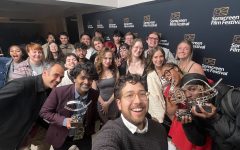Class Spotlight: Biotechnology
March 29, 2017 2017-03-01 16:00Class Spotlight: Biotechnology

by Charlene Wang
From obscure fields such as the science of pharming, to popular controversial topics such as GM foods, biotechnology covers a vast variety of subjects. Introduction to biotechnology illustrates and teaches the various procedures and techniques behind significant scientific findings, such as the creation of DNA sequencing and the development of vaccinations. Though biotechnology did open up many topics, my experiences both in the class and in the lab were aimed primarily towards the medical field due to my choice in research topics and my own personal interests. This course deals with real life applications of biology and problem solving.
One of the most important aspects of biotechnology is the way it is used to diagnose societal health issues, such as in the case of edible vaccines. Though vaccines are highly accessible in the U.S. and other western countries, this is not the case in impoverished third world countries. The lack of accessibility to protection for the impoverished led to the idea of edible vaccines through the injection of cloned genes into the chloroplasts of plants. This new technology aimed to produce crops that could orally administer vaccinations, allowing societies to cultivate and distribute their own vaccines in crops such as potatoes. Biotechnology seeks to provide solutions to societal and medical issues, constantly evolving to improve current human conditions. The course covered a wide variety of conflicts and solutions, including the development of genetically modified (GM) foods and creation of artificial proteins through pharming.
Biotechnology is a quickly developing field of science, eliminating problems in areas such as medicine. Much of biotechnology focuses on identifying and solving problems, such as understanding why experiments fail and how they can be modified. During the lab, I was introduced to new equipment and techniques while actively participating in research. We sought to find a connection between overeating and the development of Alzheimer’s in humans through the use of C. elegans, a model organism that shares Alzheimer’s genes with humans. Throughout the lab I was able to experience firsthand the importance of purification methods and the process of improving lab procedures through trial and error. The lab taught us how to use machines such as the autoclave, spectrophotometer, and the centrifuge, enabling us to measure optical densities of E. coli and stressing the consequences of lab errors such as contamination. In order to improve our technique and experimental procedure, we were given the opportunity to look through research articles to review and analyze newer procedures being utilized in other laboratories. Much of the time spent within biotechnology lab was funneled towards error analysis and learning from previous mistakes, teaching us how scientific research relies on building off of the past work of not only ourselves, but others as well.
Biotechnology was a unique course in the way it introduced new scientific discoveries and provided relatable real-life examples of how essential science is in our day-to-day lives. The laboratory allowed us to experience firsthand the obstacles and the successes that often come with research, as well as the importance of reevaluation. Overall, biotechnology was an enjoyable course I would recommend to anyone with an interest in seeing the practical applications of biological research.
To learn more about biology at PUC, visit the department of biology website.





